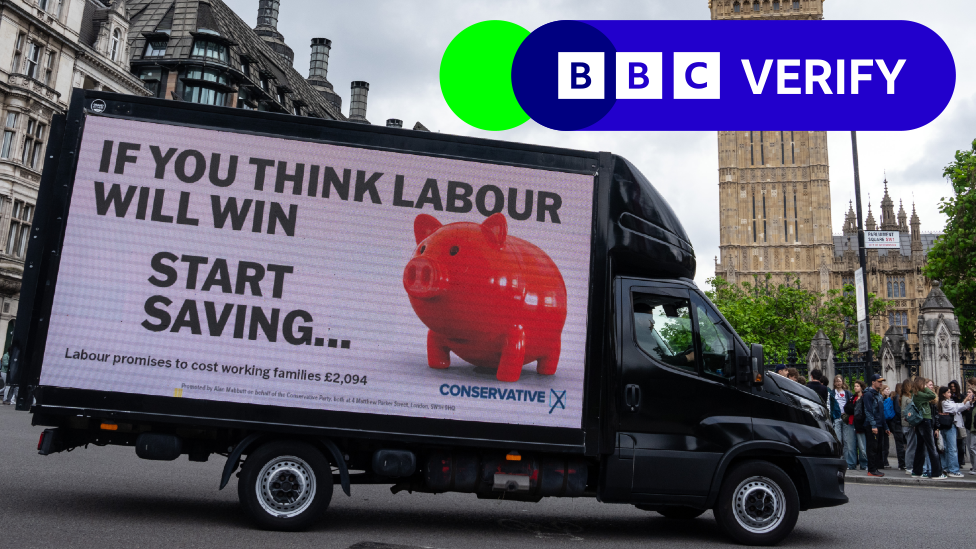Conservative claim that Labour would cost families £2,000 fact-checked

- Published
In their first head-to-head televised debate of the election campaign, Rishi Sunak repeatedly claimed Keir Starmer would bring in "£2,000 in higher taxes for every working family in our country".
The Conservatives came up with this figure by adding up how much they claim Labour's spending commitments would cost over four years (£38.5bn), and dividing this by the number of UK households with at least one person working.
The figure risks misleading people, not least because it is really totting up more than £500 a year extra over four years, which is not what you would normally think of if somebody said your taxes were going up by £2,000.
The statistics regulator said, external two days after the debate that they had warned against this practice and that "someone hearing the claim would have no way of knowing that this is an estimate summed together over four years".
The prime minister defended the figure, saying that "independent Treasury officials have costed Labour's policies", but a letter from the top civil servant at the Treasury said that it "should not be presented as having been produced by the Civil Service".
Labour disputes the figure and, like the Conservatives, has promised not to increase income tax, National Insurance or VAT during the next Parliament.
Many of the items the Tories added up involve relatively small amounts of money.
So we've looked at the five biggest - and some are accurate, but others are less reliable.
Top official's letter casts doubt on Tory tax claim
- Published5 June 2024
Is Starmer right about a £46bn unfunded tax cut?
- Published4 June 2024
Green prosperity plan
The biggest Labour spending commitment, external identified by the Tories is the Green Prosperity Plan, which they have costed at £19bn over four years - about a third of total spending in the dossier.
That figure comes from Labour, not the civil service. In February, Labour said its policies would involve a £23.7bn investment over the next parliament (five years) – which does equate to £19bn over four years.
The dossier mentions other much higher figures, but eventually settles on this one.
Under Labour's green plan, it is pledging fully clean electricity by 2030, with the aim of cutting the UK’s greenhouse gas emissions and reducing energy bills.
Its policies include setting up Great British Energy – a publicly-owned company to invest in low carbon sources like offshore wind and nuclear – and a Warm Homes Plan to improve home insulation.
Insourcing
The next biggest commitment is insourcing, which the Conservatives say will cost £6.5bn over four years.
The idea of insourcing is to stop public services being provided by private companies and give them back to the state to carry out.
There is no question that Labour are enthusiastic about insourcing, but they have not given details of where and how quickly it would happen, so a lot of assumptions are needed to come up with this costing.
One is that outsourced services are 7.5% more efficient than insourced ones, based on a report from the Institute for Government, external.
But what the report actually says is that while some outsourcing has led to greater efficiency, other attempts have resulted in "significant overspend, while a string of failures has damaged public trust".
The 7.5% figure is only mentioned once in the report, as the lower end of the savings from outsourcing cleaning services.
The dossier, external actually warns about the use of the 7.5% figure: "We have low confidence in this because the difference between the cost of outsourcing and in-house delivery is highly circumstance specific."
The Conservatives are keen to stress that the dossier's cost calculations have been done by civil servants, but their work was based on assumptions made by special advisers, who are temporary civil servants and are appointed by Conservatives.
They are not expected to be impartial in the way that regular civil servants are.
Double NHS scanners
Shadow health secretary Wes Streeting said in late 2023 that he wanted to double the number of CT and MRI scanners in the NHS.
This is likely to end up in the manifesto because it was mentioned as part of Labour's five missions, external, although no deadline has been given for buying them.
The policy has been costed by the Tories at, external £6bn over four years.
There are uncertainties in the costing, in particular that it has set out the costs of the policy but not of any benefit from it in terms of greater efficiency in the NHS from having the latest equipment and of early diagnosis in terms of saving money on treatment.
On the other hand, they have not included the cost of hiring and training new staff to operate the scanners, so the costing could have been higher.

Breakfast clubs
The provision of free breakfast clubs at primary schools is one of the things that Labour says would be funded by ending tax breaks for private schools.
This is also part of one of Labour's five missions, external.
But the details of the policy are not yet entirely clear. We do not know whether the clubs would include free childcare as well as breakfast and the overall cost would depend on the take-up.
The £4.5bn that the Conservatives have scored it at, external assumes that both food and staffing would be paid for and that half of all pupils would take advantage of the service.
NHS appointments
Number five on the list is having two million more NHS appointments, external per year, which is costed at just under £4bn.
This measure was one of Labour's "first steps for change, external".
It is a pledge for Labour's first five years in office, although they have not said how long it would take them to provide the extra 40,000 appointments a week, so charging the full cost in the early years of the Parliament may not be accurate.
The dossier assumes the appointments would be more expensive than existing ones because they would be at evenings and weekends, which is in line with Labour policy.
Extra money raised
The dossier also looks at how much will be raised by some of the tax measures that Labour has announced, which involves considerable uncertainty.
On the value of charging VAT on private school fees, external, for example, it is assumed that 11% of pupils will be moved to state schools as a result of the policy.
Similarly, the amount raised from extending the windfall tax on energy companies, external depends on what happens to oil and gas prices.
We asked independent think tank the Institute for Fiscal Studies what they thought of the dossier and they told us they were waiting for the actual manifestos to be published before commenting on the totality of costs.
We have also looked at Labour claims of a £71bn black hole in Conservative plans.

